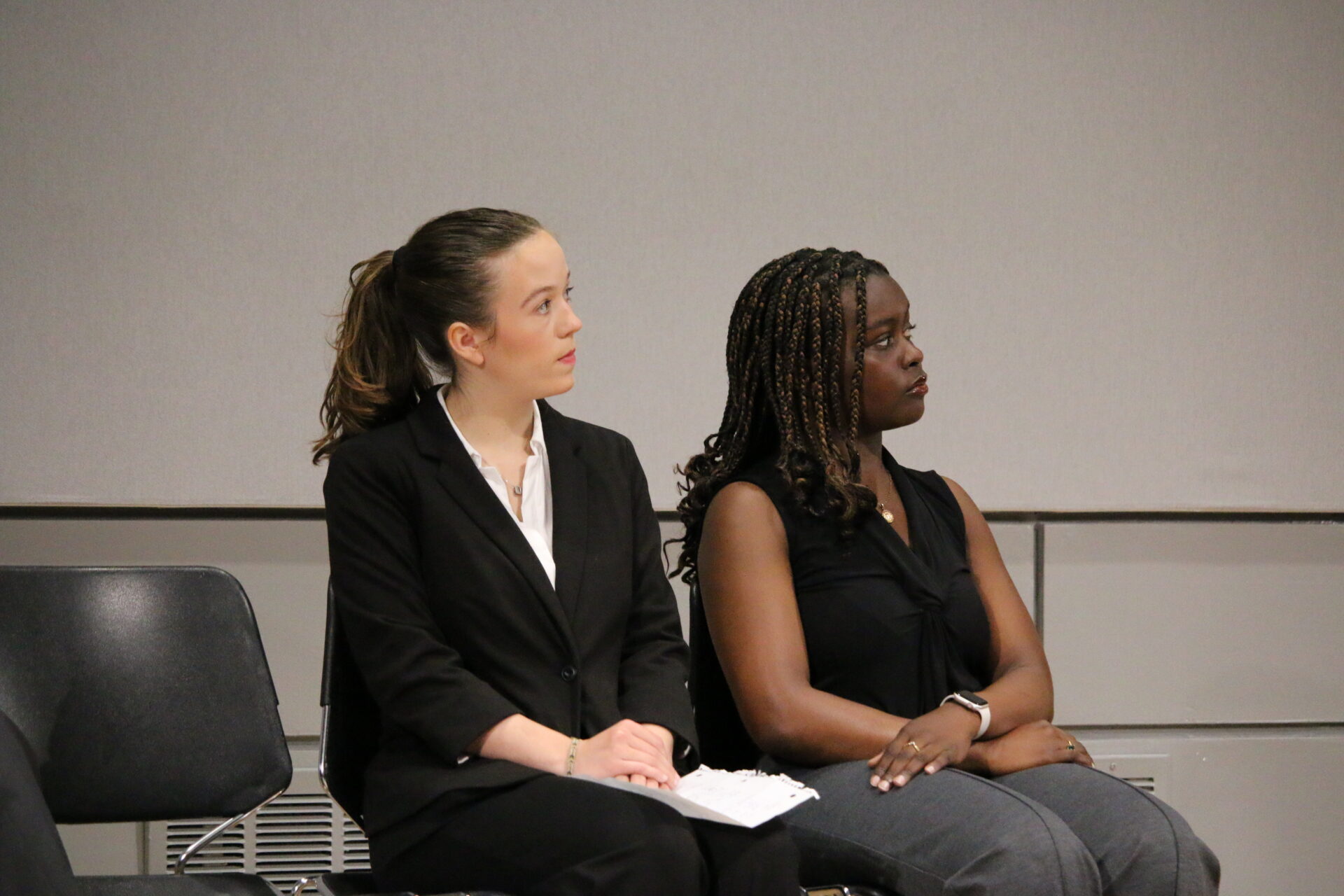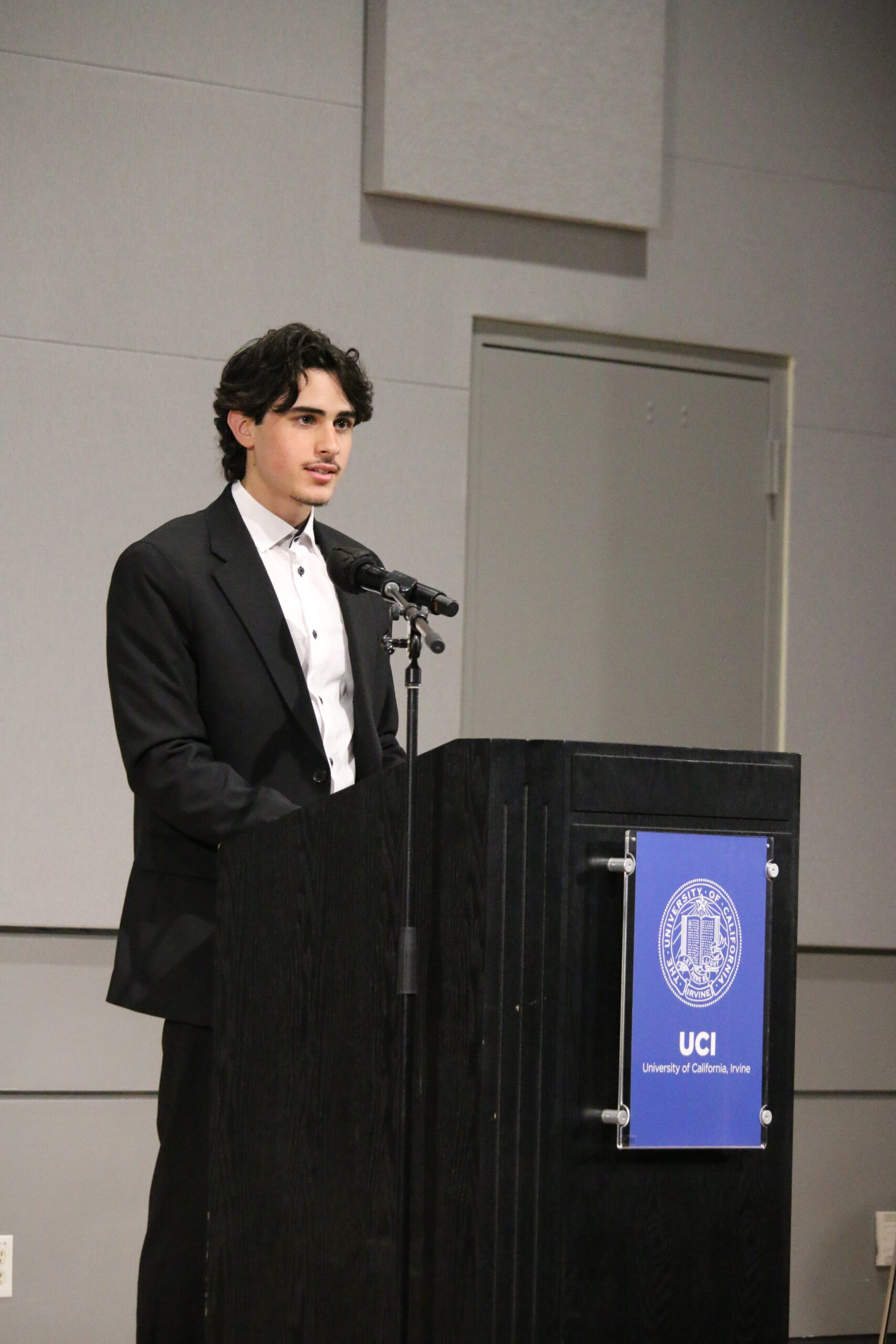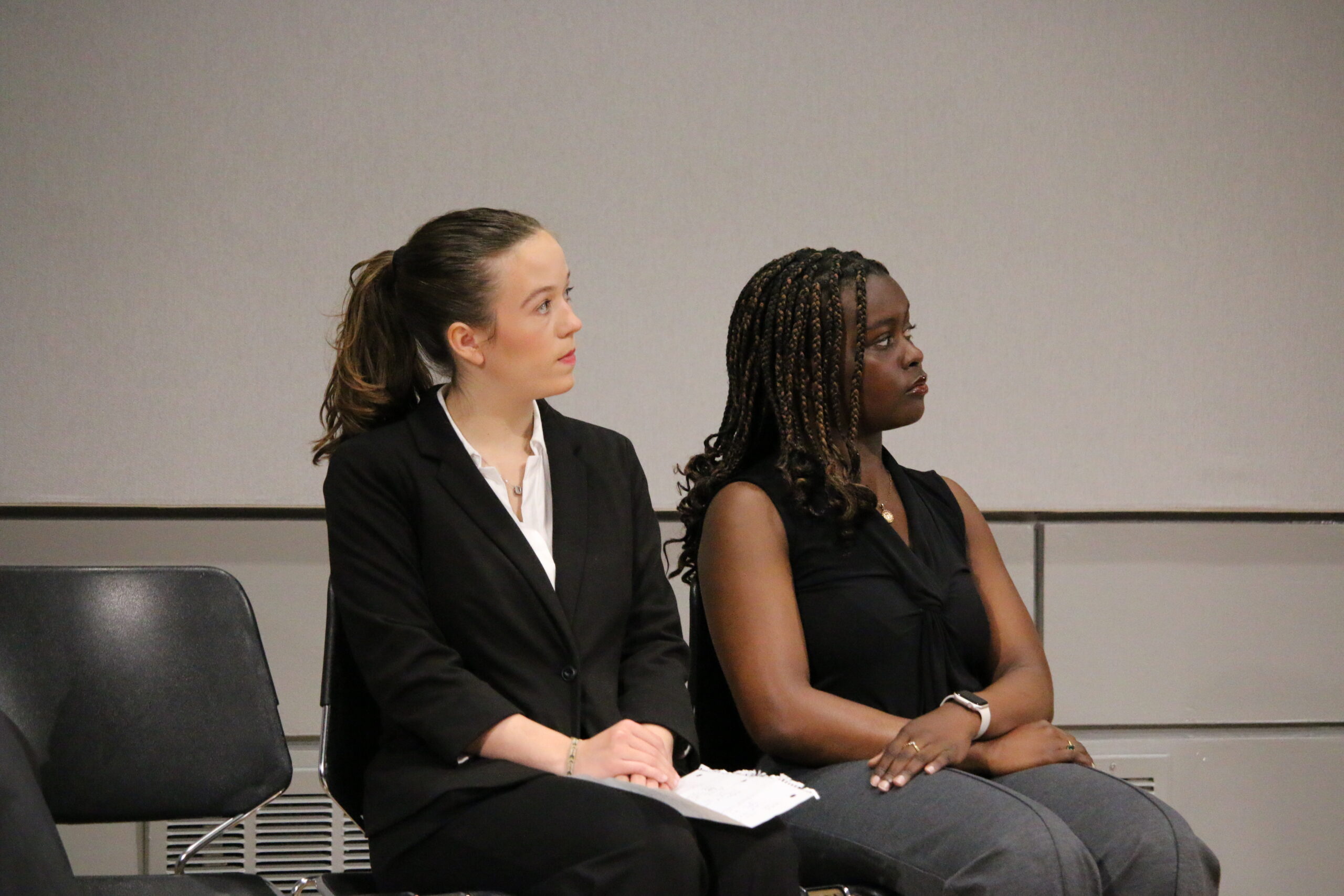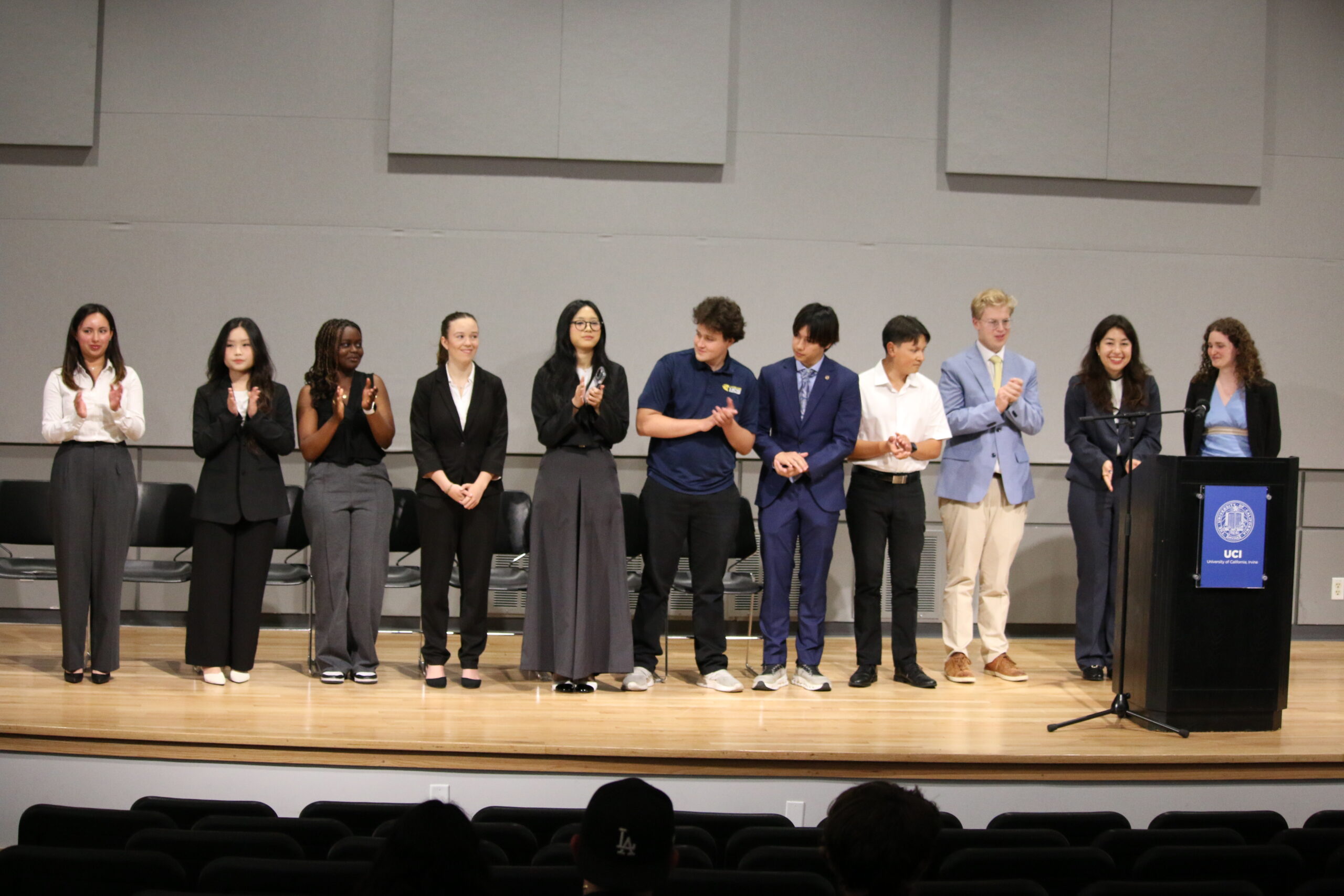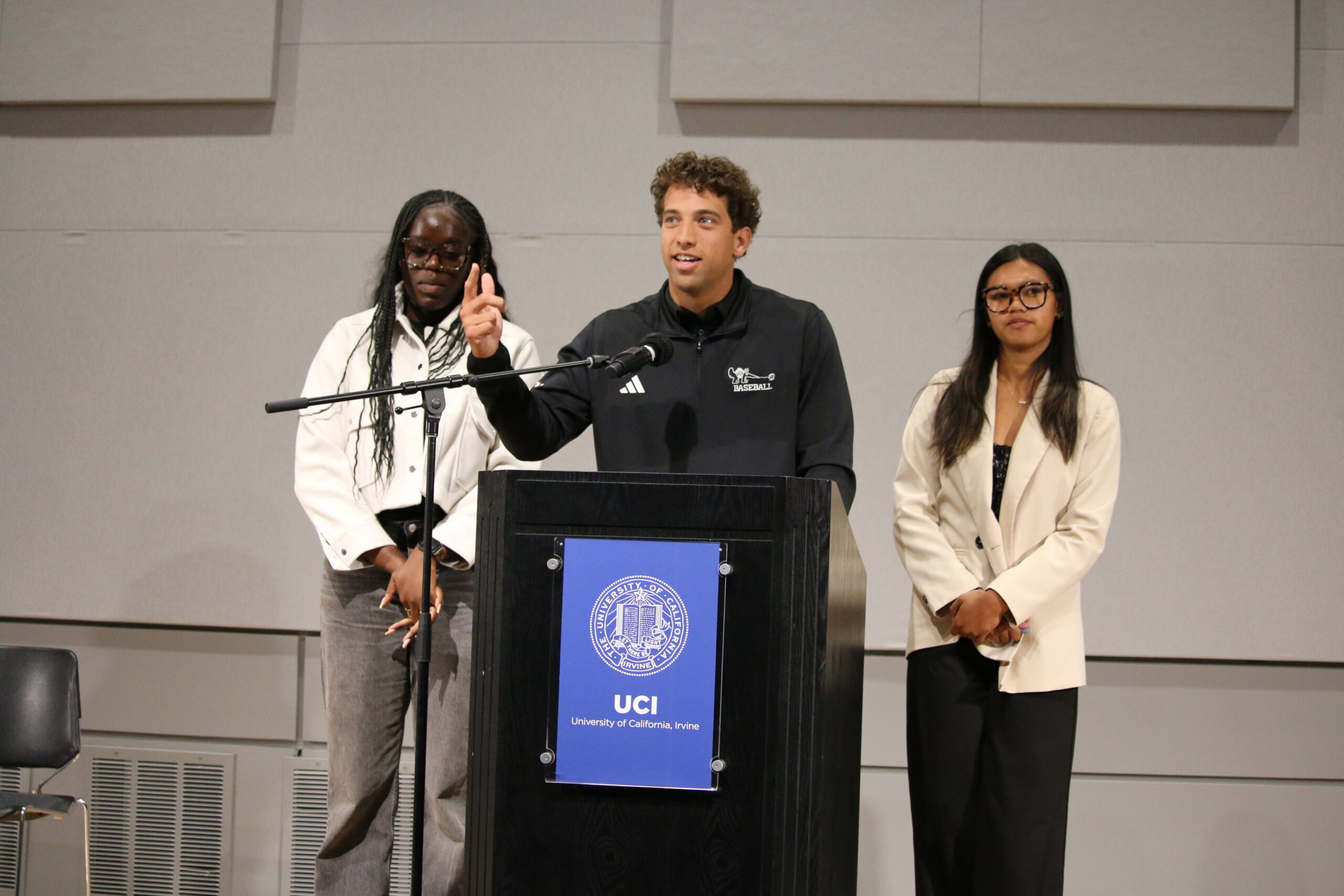The Associated Students of UCI (ASUCI) hosted a senatorial debate and referendum forum featuring candidates running for positions in the upcoming ASUCI election. The event was held at the Crystal Cove Auditorium in the Student Center on April 7.
Senatorial Debate
The ASUCI Senate is the legislative branch of UCI, composed of 29 seats: seven at-large senators, 19 school-specific senators, an international senator, a first-year senator and a transfer senator.
At the debate for at-large senator, five out of 14 candidates were present: Temitayo Akande, Lauren Jernigan, Ennes Kahf, Amelia Nguyen and Oliver Wise.
Akande is a second-year business administration and political science double major and current at-large senator. In her opening statement, she highlighted the importance of students’ sense of belonging at UCI and bridging the gap between faculty and students. In her answers regarding the position and her approach to representing students, Akande emphasized the importance of individual outreach and attending meetings of Registered Club Organizations (RCOs). When asked about the biggest challenge facing UCI students, Akande said that the question cannot be answered simply, as challenges are subjective. She again noted the importance of listening to individuals. Similarly, when asked about the Senate’s ability to issue statements on behalf of the student body, Akande said she views the Senate as a “vehicle” for students and their voices.
Jernigan is a first-year psychology major and current first-year senator. She expressed a desire to increase outreach between ASUCI and the general student population and emphasized the need to represent every single student voice. Jernigan said she intends to hold town halls to provide a space for student input, as well as distribute a Microsoft Form survey to collect opinions. She said establishing a fundraising process is necessary to increase transparency and accountability in ASUCI, which would extend its reach to the larger student body. To issue Senate statements, Jernigan would consult the students most affected by a specific issue.
Kahf is a first-year literary journalism major. He emphasized the importance of increasing representation for two populations that he said do not receive adequate resources: Syrian American and Middle Eastern students, and commuter students. Kahf cited his experience as a student journalist in listening to every voice on campus and telling untold stories. He emphasized a senator’s duty to reach out and bring student opinions to the Senate. Kahf said he aims to be a voice for UCI students in Senate meetings.
Nguyen is a first-year global cultures and international studies double major and current humanities senator. She intends to expand career support for all academic disciplines. Additionally, Nguyen wants to simplify and standardize procedures for RCOs to apply for and receive funding as a means to represent every voice. She also emphasized the importance of following through on promises in the ASUCI Senate as a way to increase positive outcomes and good representation.
Wise is an undergraduate undeclared major. He stated that he believed being a senator is more than representation — it is to provide “encouragement” for students to get involved with events at UCI beyond ASUCI. He said funding and affordability are challenges facing all UCI students, including the cost of course material and access to financial aid. Wise suggested he would create a social media campaign for ASUCI to increase visibility, which would in turn increase transparency. When representing students in a statement from the Senate, he said he would try to represent the clearest voice.
The candidates not present for the at-large senator position were Gabriel Mutsvangwa, Dev Goel, Caprice Coldsnow, Jonathan Webster, Karsten Schubert, Sevan Minassian-Godner, Prateek Suram, Priya Khetarpal and Nasser Ssenyange.
At the debate for the two engineering senator positions, two out of five candidates were present: Ethan Hatch and Dylan Richcreek.
Hatch is a second-year chemical engineering major. He said that because the Henry Samueli School of Engineering has a diverse group of majors, interests and RCOs, he would aim to introduce an advisory board for better communication and a discussion place for engineering students so he can bring input back to the Senate.
Richcreek is a first-year mechanical engineering major and current engineering senator. He said it would be important to bring information to engineering students, increase funding and resources and amplify student voices.
The candidates not present for the engineering senator position were Christine Yiu, Nithila Murugesan and Evan Hofmann.
At the debate for the humanities senator position, one of two candidates was present: Jose Solis Ramos.
Solis Ramos is a second-year history and philosophy double major with a minor in political science. He said he wants to foster meaningful impacts and expand career opportunities for humanities students. He expressed interest in outreach to humanities students to ensure they feel comfortable sharing their experiences and opinions.
The candidate not present for the humanities senator position was Matt Lee.
At the debate for the three social science senator positions, two out of six candidates were present: Naomi Paskowitz and Jayla Pete.
Paskowitz is a second-year political science major. She said she wants to amplify voices, fight for career support, make campus more inclusive and advocate for affordable housing. She said she has passion and previous experience to support her goals.
Pete is a second-year political science, anthropology and criminology, law, and society triple major. She said she wants to enact real change and fight for the students she would represent. Pete said she would fight for open source materials, advocate for policies that reflect student needs and lead with intention. She also stated that the Senate should prioritize and magnify student voices.
The candidates not present for the social science senator positions were Jasmyn Schubert, Ariana Perez, Arushi Pattar and Emily Phan.
At the debate for the special interest international senator position, two out of three candidates were present: Hong Pham and Sofia Gomez-Inowe.
Pham is a third-year business administration major and current international senator. She said she wants to expand internship and sponsorship opportunities for international students and obtain improved legal guidance. She intends to speak for students in Senate meetings and connect with international students through surveys and emails.
Gomez-Inowe is a first-year international studies major with a humanities and law minor. She said she believes the path to inclusion embraces different perspectives. In this, she would reach out to RCOs where international students are involved to learn about their career challenges and the guidance they need. She claims it is important to include international students’ perspectives and communicate it effectively to the Senate.
Referendum Forum
Student-athletes Ofure Iselen, Jacqueline Acosta and Chase Call introduced the Meet the Moment Student Fee Referendum and answered questions from ASUCI before opening the floor to the audience.
If approved in the upcoming election, a fee of $180 per student per quarter, or $540 annually, would be added to student fees beginning in fall 2025. The quarterly fee would increase by $10 annually, reaching $220 per quarter for the 2029-30 academic year. The fee would be used to create an NCAA Women’s Beach Volleyball team and fund “student-centered special events designed to elevate campus life, such as concerts and spirit rallies.”
The proponents of the fee responded to audience questions about the plan for the women’s beach volleyball team, stating the plan would be made after the fee is approved. When asked about the financial impact on students, the proponents said it is an investment that will raise the value of a UCI degree by increasing the university’s name recognition.
New University Editor-in-Chief Skylar Paxton introduced the New University Support Student Journalism Student Fee Referendum. No questions were raised during the audience portion.
If approved, a fee of $2 per student per quarter, or $6.00 annually, would be added to student fees. The fee would support the expansion of New University resources and the publication of biweekly print editions. The New University has been a mostly digital publication since 2018, fully shutting down print operation in 2023. Printed newspapers would be free to students and supported by the student fee.
Paxton said that if the fee is passed, students could expect to see newspaper stands around campus and a more physical experience of news that everyone can access. She said New University would remain transparent and release statements regarding any financial changes. She added that the fee would support New University’s ongoing dedication to providing a space for student voices and upholding the right for students to speak loudly and proudly.
Voting begins April 14 at 9 a.m. and ends April 18 at 5 p.m. Election results will be released on Wednesday, April 30. For more information on the upcoming ASUCI election, visit here.
Alyse Billiard is a News Staff Writer. She can be reached at abilliar@uci.edu.
Edited by Jaheem Conley

